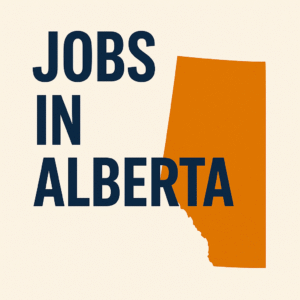

Alberta’s economy is growing, and that means more job opportunities for everyone, including those coming from other countries. If you’re looking to find a job in Alberta as a foreigner, it can seem a bit overwhelming at first. But with the right information and a solid plan, you can definitely land a great job. This guide will walk you through what you need to know to start your job search and make Alberta your new home.
So, you’re thinking about packing your bags and heading to Alberta for work. That’s a big move, and it’s smart to get a handle on what the job scene is actually like here, especially for folks coming from abroad. It’s not always as straightforward as you might think, but with a bit of research, you can definitely find your footing.
Alberta’s economy is pretty diverse, but some sectors are definitely looking for more hands than others. Think about fields like technology, healthcare, and skilled trades. These areas often have a steady demand for qualified workers, and that includes people from other countries. The energy sector, while historically strong, can be a bit up and down, but it still offers opportunities. It’s worth looking into specific roles within these industries – sometimes a niche skill is exactly what an employer is searching for.
Here’s a quick look at some areas that often have openings:
It’s a good idea to check official Alberta government resources for the most current lists of in-demand occupations.
When you’re looking at jobs, you’ll want to know what you can expect to earn. Alberta has a minimum wage, which is the lowest amount an employer can legally pay you per hour. As of late 2023, it’s set at $15.00 per hour for most workers. However, for many jobs, especially those requiring specific skills or experience, the actual pay will be quite a bit higher than the minimum.
Average salaries can vary wildly depending on your profession, your experience level, and where in Alberta you’re working (cities like Calgary and Edmonton tend to have higher salaries but also a higher cost of living). It’s wise to research typical salary ranges for your specific job title using online tools before you accept an offer. Don’t be afraid to ask potential employers about their compensation packages.
Alberta isn’t just about traditional employment; there are also pathways for those who want to start their own thing. If you have a business idea or a service you want to offer, you might be able to come to Alberta as an entrepreneur. There are specific programs designed to attract business people who plan to invest in and contribute to the local economy. This route usually involves a more complex application process and requires a solid business plan, but it can be a rewarding option if you’re looking for more independence.
Starting a business in a new country can feel daunting, but Alberta has resources to help. Understanding the local market and regulations is key to making your venture a success.

Alright, so you’ve decided Alberta is the place to be for your career goals. That’s awesome! But getting your foot in the door, especially as a foreigner, takes a bit of planning. It’s not just about showing up; there are some key things you absolutely need to sort out first.
This is probably the most important piece of the puzzle. You can’t just start working in Canada without the proper authorization. For most foreign workers, this means getting a work permit. The type of permit you need often depends on the job offer you have. Sometimes, your employer will need to get something called a Labour Market Impact Assessment (LMIA) to show that hiring a foreign worker won’t negatively affect the Canadian job market. It sounds complicated, and honestly, it can be, but it’s a necessary step. Make sure you understand the requirements for your specific situation before you even think about packing your bags.
This is a big one. Many work permits and certainly pathways to permanent residency require you to have a confirmed job offer from a Canadian employer before you can even apply for the permit. This offer needs to be legitimate, and often, the employer will need to prove they couldn’t find a Canadian citizen or permanent resident to do the job. So, your job search really needs to focus on finding employers who are willing and able to hire foreign workers. It’s a bit of a chicken-and-egg situation sometimes, but that formal offer is your golden ticket for many situations.
Alberta, like other provinces, has its own way of attracting skilled workers through Provincial Nominee Programs (PNPs). These programs are designed to help the province meet its specific labor needs. If you have skills or experience in an industry that Alberta is looking to fill, you might be eligible to apply through the Alberta Advantage Immigration Program (AAIP). Getting nominated by the province can significantly speed up your immigration process and often makes it easier to get a work permit or even permanent residency. It’s definitely worth looking into whether your qualifications align with Alberta’s PNP streams. They often have specific requirements, so do your homework on their website.
So, you’ve got a handle on the job market and you’re ready to start applying. That’s great! But hold on a sec. Applying for jobs in Alberta, or anywhere in Canada really, has its own quirks. You can’t just send over the same application you used back home and expect magic to happen. Canadian employers have specific expectations for resumes and cover letters. It’s all about presenting your skills and experience in a way that makes sense to them, right from the get-go.
First things first, let’s talk about your resume. In Canada, it’s usually called a resume, not a CV, and it needs to look the part. Think clean, clear, and concise. Most employers here prefer resumes that are one to two pages long, max. No one wants to sift through a novel to find your qualifications. You’ll want to use headings like “Work Experience,” “Education,” and “Skills.” And definitely use bullet points to describe your responsibilities and achievements – it makes things easy to read.
Here’s a quick rundown of what to keep in mind:
It’s really important to make sure your resume fits the Canadian format. You can find some great examples and tips on how to make your resume shine on Canadian-style resume advice.
Your cover letter is your chance to really sell yourself and show why you’re a great fit for the specific job and company. It’s not just a summary of your resume; it’s a personal introduction. Start by addressing it to a specific person if you can find their name. Then, show that you’ve done your homework on the company. Mention something specific you admire about their work or their mission. After that, clearly explain why your skills and experience match the job requirements. Don’t just repeat what’s on your resume; expand on it and provide context.
Remember to include:
A well-written cover letter shows you’re serious about the opportunity and have taken the time to understand the employer’s needs. It’s your first impression, so make it count.
Okay, so you’ve landed an interview – congrats! Now, how do you prepare for a Canadian job interview? It’s pretty similar to interviews elsewhere, but there are a few things to keep in mind. Employers want to see if you’re a good fit for the team and the company culture, not just if you have the right skills. Be ready to talk about your past experiences using the STAR method (Situation, Task, Action, Result). This helps you give clear, structured answers.
Interviews are a two-way street. It’s your chance to learn about the job and the company, and for them to learn about you. Be polite, enthusiastic, and professional throughout the process. If they offer you the job, you’ll receive a formal job offer, which is the next big step.
Looking for a job can feel like a full-time gig itself, right? Luckily, the internet has made things a lot easier. There are tons of websites out there where employers post openings. Job Bank is a big one, run by the government, and it gets thousands of new listings every single day. It’s a solid place to start. Then there are sites like LinkedIn, Indeed, and Workopolis, which are super popular. You can set up alerts for jobs that match what you’re looking for, which saves you from constantly checking. Some sites even let you upload your resume so employers can find you. It’s all about casting a wide net online.
While online is great, don’t forget about face-to-face interactions. Job fairs are fantastic for this. You can actually meet hiring managers, hand them your resume, and talk about opportunities on the spot. It’s a chance to make a real impression. Plus, you can learn a lot about different companies just by talking to their representatives. Networking events are also key. These aren’t always formal job fairs; sometimes they’re industry meetups or community gatherings. The idea is to meet people, let them know you’re looking for work, and see if they know of any openings. You’d be surprised how many jobs are found through word-of-mouth – the hidden job market, as they call it.
If you’re new to Alberta, there are services specifically designed to help you. Organizations like the YMCA often have free employment programs for newcomers. They can help you polish your resume, practice interview skills, and even connect you with potential employers. Some services focus on helping internationally trained professionals get their credentials recognized or find bridging programs to get you working in your field faster. These places understand the challenges newcomers face and have resources to help you get settled and find work. Don’t hesitate to reach out to them; that’s what they’re there for.
Getting your foot in the door in Alberta’s job market often comes down to more than just your skills and experience. Two big pieces of the puzzle are how well you communicate and how you fit into the local work environment. Let’s break down what that means for you as a newcomer.
Most jobs here in Alberta will require you to have a good handle on English. This means being comfortable reading job postings, writing emails to colleagues or clients, speaking up in meetings, and understanding instructions. If English isn’t your first language, don’t worry, there are plenty of resources available to help you get better. Many settlement organizations offer free English classes specifically for newcomers. These classes can really boost your confidence and make you a more attractive candidate to employers. Focusing on workplace-specific vocabulary can give you a real edge. You can often find these programs through local immigrant-serving agencies.
Every place has its own way of doing things, and Alberta is no different. Canadian workplaces, and Albertan ones specifically, tend to value things like punctuality, direct communication, and teamwork. It’s usually a good idea to be on time for meetings and appointments, and to be clear and straightforward when you’re talking to people. While it might feel a bit different at first, adapting to these norms can make your work life much smoother.
Adapting to the local business culture isn’t about changing who you are, but rather understanding the expectations and norms of the environment you’re working in. It’s about showing respect and professionalism.
Networking is a big deal in Canada, and Alberta is no exception. It’s not just about finding job openings; it’s about making connections with people in your field.
Here are a few ways to get started:
So, you’re looking to work in Alberta, but your job doesn’t quite fit the usual mold? Don’t worry, Canada has a bunch of specific programs designed for certain types of workers. These aren’t your everyday job applications; they’re tailored for folks in particular fields or with unique circumstances. It’s worth looking into these because they can sometimes offer a more direct path to working legally in the province.
If you’re in the caregiving or agricultural sector, there are specific pilot programs you might qualify for. These programs recognize the need for workers in these areas and provide a pathway for them to come to Canada. For caregivers, this could mean roles assisting children, the elderly, or people with disabilities. For agricultural work, it covers a range of jobs on farms, from planting and harvesting to operating machinery. Meeting the specific experience and language requirements is key for these roles.
Alberta also has avenues for business professionals. This could include people looking to start their own business or invest in the province. If you have a solid business plan and the capital to back it up, there are programs that can help you set up shop. It’s not just about having money; it’s about having a viable plan that will benefit the local economy. You’ll likely need to show how your business will create jobs or bring new services to Alberta.
Starting a business in a new country can feel like a huge undertaking. It’s a good idea to connect with local resources that can help you draft a business plan and understand the legal requirements. They’ve seen it all before and can offer practical advice.
Beyond caregivers, farmers, and business folks, there are other specialized permits. These can sometimes be for workers in unique industries or those with very specific skills that are in high demand. Think about fields like specialized trades, certain tech roles, or even research positions. The best way to find out if you fit into one of these niche categories is to research the latest immigration streams and requirements published by the Canadian government. Sometimes, these programs have limited openings, so staying informed is important.
So, you’ve made it this far, and hopefully, you’re feeling a lot more confident about finding work in Alberta. It’s definitely a process, and sometimes it feels like a lot, but remember all the steps we’ve talked about. Getting your documents ready, looking at job boards, maybe even checking out those newcomer services – it all adds up. Don’t get discouraged if it takes a little time. Alberta’s a big place with lots of opportunities, and with a bit of patience and persistence, you’ll find your spot. Keep at it, and welcome to Alberta!
Alberta often looks for skilled workers in fields like tech (software developers, IT specialists), healthcare (nurses, doctors), trades (electricians, plumbers), and agriculture. Keep an eye on job boards that list jobs needing foreign workers.
Yes, most likely. You’ll usually need a work permit from the Canadian government. Sometimes, you might also need a Provincial Nominee Program (PNP) certificate from Alberta if you’re applying through that route. It’s best to check the official Canadian immigration website for the most current rules.
You can search online job sites like Indeed, LinkedIn, and specialized Canadian job boards. Attending job fairs, even virtual ones, can also be helpful. Networking with people already working in Alberta is another great way to find out about unadvertised jobs.
In Canada, people usually use the term ‘resume’ for job applications. It’s a short document highlighting your skills and work history relevant to the job. A CV is typically longer and used more in academic or research fields.
Strong English skills are really important for most jobs in Alberta. While some jobs might not require perfect fluency, having good speaking, listening, reading, and writing skills will make your job search much easier and open up more opportunities.
Yes, Alberta has programs that allow foreigners to start businesses. You’ll need a solid business plan and might need to show you have the funds to invest. Check Alberta’s immigration or business development websites for specific requirements.

So, you're curious about what a restaurant manager actually does in Canada, right? It's more than just telling people what to do. This role involves juggling a lot of different tasks to keep a restaurant...

Thinking about a career in carpentry in Canada? It's a trade with good job prospects, especially with the country's housing needs. Whether you're interested in building homes, working on big commercial projects, or even heading...

Thinking about a career in carpentry in Canada? It's a solid trade, and you're probably wondering about the money. This guide breaks down what you can expect to earn as a carpenter across Canada in...
JobLinksCanada © 2026 All rights Reserved